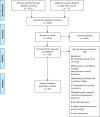Barriers and facilitators for cascade testing in genetic conditions: a systematic review
- PMID: 32948847
- PMCID: PMC7784694
- DOI: 10.1038/s41431-020-00725-5
Barriers and facilitators for cascade testing in genetic conditions: a systematic review
Abstract
Cascade testing is the process of offering genetic counseling and testing to at-risk relatives of an individual who has been diagnosed with a genetic condition. It is critical for increasing the identification rates of individuals with these conditions and the uptake of appropriate preventive health services. The process of cascade testing is highly varied in clinical practice, and a comprehensive understanding of factors that hinder or enhance its implementation is necessary to improve this process. We conducted a systematic review to identify barriers and facilitators for cascade testing and searched PubMed, CINAHL via EBSCO, Web of Science, EMBASE, and the Cochrane Library for articles published from the databases' inception to November 2018. Thirty articles met inclusion criteria. Barriers and facilitators identified from these studies at the individual-level were organized into the following categories: (1) demographics, (2) knowledge, (3) attitudes, beliefs, and emotional responses of the individual, and (4) perceptions of relatives, relatives' responses, and attitudes toward relatives. At the interpersonal-level, barriers and facilitators were categorized as (1) family communication-, support- and dynamics-, and (2) provider-factors. Finally, barriers at the environmental-level relating to accessibility of genetic services were also identified. Our findings suggest that several individual, interpersonal and environmental factors may play a role in cascade testing. Future studies to further investigate these barriers and facilitators are needed to inform future interventions for improving the implementation of cascade testing for genetic conditions in clinical practice.
Conflict of interest statement
The authors declare that they have no conflict of interest.
Figures
References
-
- Gupta S, Ahnen DJ, Chen L-M, Chung DC, Cooper G, Early DS, et al. NCCN guidelines Version 3. 2019 genetic/familial high-risk assessment: Colorectal [Internet]. [cited 2019 Dec 18]. 2019. https://www.nccn.org/professionals/physician_gls/pdf/genetics_colon.pdf.
-
- Cascade Testing: Testing Women for Known Hereditary Genetic Mutations Associated With Cancer - ACOG [Internet]. [cited 2019 Dec 18]. https://www.acog.org/Clinical-Guidance-and-Publications/Committee-Opinio....
-
- Goldberg AC, Hopkins PN, Toth PP, Ballantyne CM, Rader DJ, Robinson JG, et al. Executive summary familial hypercholesterolemia: screening, diagnosis and management of pediatric and adult patients clinical guidance from the national lipid association expert panel on familial hypercholesterolemia background and rationale. J Clin Lipidol. 2011;5:1–8. - PubMed
-
- Abul-Husn NS, Manickam K, Jones LK, Wright EA, Hartzel DN, Gonzaga-Jauregui C, et al. Genetic identification of familial hypercholesterolemia within a single U.S. health care system. Science. 2016;354:aaf7000. - PubMed
Publication types
MeSH terms
Grants and funding
LinkOut - more resources
Full Text Sources
Medical
Miscellaneous


